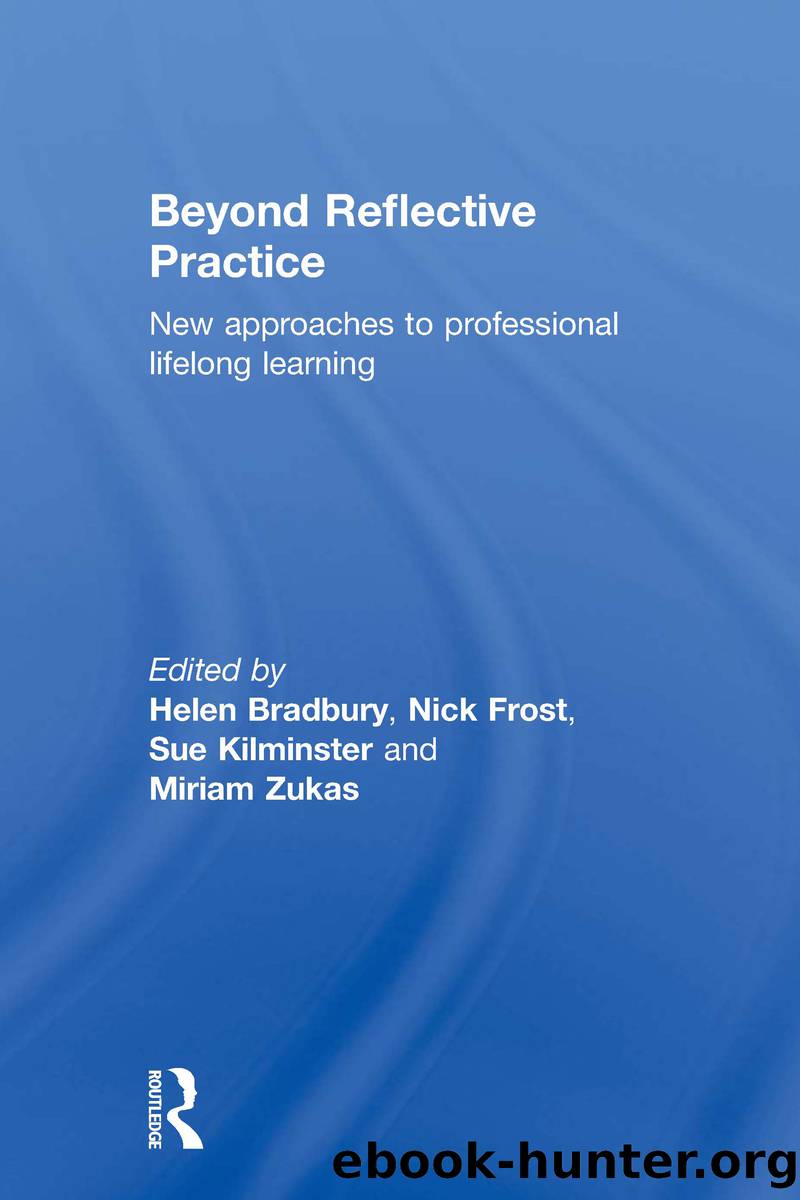Beyond Reflective Practice by Bradbury Helen;Frost Nick;Kilminster Sue;Zukas Miriam;

Author:Bradbury, Helen;Frost, Nick;Kilminster, Sue;Zukas, Miriam;
Language: eng
Format: epub
Publisher: Taylor & Francis Group
Published: 2010-08-15T00:00:00+00:00
Patients as experts
A further challenge for professional learning is the changing pattern of morbidity. The predominant disease pattern in England, and most other developed countries, is one of complex and continuing illness, rather than acute disease. In Britain alone, 17.5 million people live with a long-term condition. Professional and popular cultures tend to prioritise acute care, portraying professionals in heroic roles which give us all hope of effective medical intervention. Chronic problems, however, require continuity and emphasise the importance of beneficial, active relationships and working with patients' expertise from experience.
The Experts Patient programme has become mainstream policy in the NHS (Department of Health 2001). This educational programme for patients, delivered by volunteers who themselves have a long-term condition, is based on evidence about the positive impact of peer-support and education in supporting self-management. Some groups are more professionally led than in the self-help movement which inspired the programme, and evaluation has shown mixed results (National Primary Care Research and Development Centre 2007). Findings of a randomised trial of participants identified moderate gains in self-efficacy (belief in one's capability to produce an effect), some reductions in costs of hospital use and no impacts on routine health service use. However, the study also revealed high levels of satisfaction with the course, and social support from attending a group was highly valued, sparking debates about whether formal evaluations have elevated professionally defined outcome measures and not taken sufficient account of outcomes that are valued by patients.
Self-help groups have been described as developing self-esteem, confidence, perceived control over long-term conditions and a renewed sense of identity (Kelleher 1994). Supportive discussion of their situations and feelings helps people to reframe their experience. This not only serves to âlet off steamâ (approved of by professionals who cannot allow space for this in their encounters with patients), but also to enable patients to rethink their behaviours around treatment and to develop a sense of independent expertise and legitimacy about their decisions. Their focus on reflecting together on experience enables a range of concerns to be kept alive, rather than being distorted by expert systems and the discourse of the market.
Professionals are not always supportive of the idea of the expert patient. Resistance to patient expertise is widespread in professional literature and is seen as a significant barrier to patient-centred practice (Kennedy et al. 2007). Many professional views are based on untested assumptions that not only will patients make poor decisions about treatment or care routines, but also that the floodgates of relentless demand will open. A poll in 2003 found that 76 per cent of pharmacists, 63 per cent of doctors and 48 per cent of nurses thought better-informed patients would take up more of their time, be more demanding and be harder to deal with (Hart 2006). In reality, the evidence is that more informed patients may reduce, rather than increase, demand (Pollock 2006).
The moves by governments and health-service leaders to renegotiate professional and patient roles threaten professional status and values. The resulting need to maintain
Download
This site does not store any files on its server. We only index and link to content provided by other sites. Please contact the content providers to delete copyright contents if any and email us, we'll remove relevant links or contents immediately.
Navigation and Map Reading by K Andrew(4928)
Spare by Prince Harry The Duke of Sussex(4909)
Tuesdays with Morrie by Mitch Albom(4532)
Cracking the GRE Premium Edition with 6 Practice Tests, 2015 (Graduate School Test Preparation) by Princeton Review(4124)
Machine Learning at Scale with H2O by Gregory Keys | David Whiting(3831)
Never by Ken Follett(3639)
What It Really Takes to Get Into Ivy League and Other Highly Selective Colleges by Hughes Chuck(3607)
Goodbye Paradise(3588)
Harry Potter and the Prisoner of Azkaban (Book 3) by J. K. Rowling(3212)
Fairy Tale by Stephen King(3077)
Pledged by Alexandra Robbins(3075)
Kick Ass in College: Highest Rated "How to Study in College" Book | 77 Ninja Study Skills Tips and Career Strategies | Motivational for College Students: A Guerrilla Guide to College Success by Fox Gunnar(3018)
Sapiens and Homo Deus by Yuval Noah Harari(2915)
A Dictionary of Sociology by Unknown(2898)
The Social Psychology of Inequality by Unknown(2855)
Reminders of Him: A Novel by Colleen Hoover(2825)
Graduate Admissions Essays, Fourth Edition: Write Your Way into the Graduate School of Your Choice (Graduate Admissions Essays: Write Your Way Into the) by Asher Donald(2798)
Will by Will Smith(2685)
Zero to Make by David Lang(2658)
